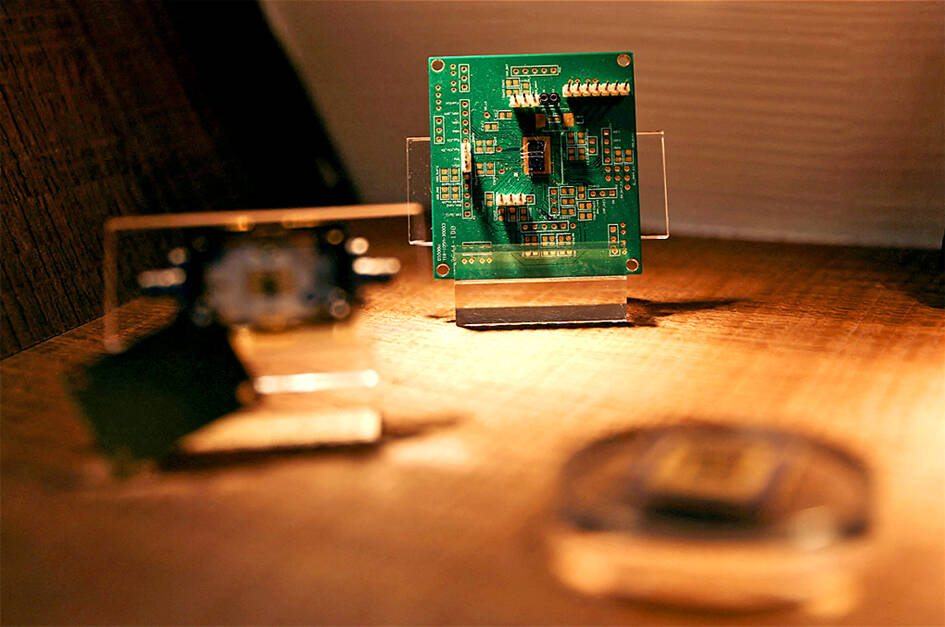Taiwan’s exports of integrated circuit (IC) chips last year rose for a seventh consecutive year, further solidifying the nation’s leadership status in a global semiconductor industry that has been roiled by US-China tensions and diversifying supply chains.
Exports of IC chips — which are pivotal components of electronic appliances, computers and smartphones — rose 18.4 percent year-on-year, the Ministry of Finance said.
It was also the third consecutive year of double-digit percentage growth.

Photo: Ann Wang, Reuters
“We believe Taiwan is irreplaceable in the near-term in the semiconductor industry,” Barclays PLC economist Bum Ki Son said in an e-mail to Bloomberg News.
Barclays said efforts by others, such as the US, to bolster chip production would not immediately have an effect on diminishing Taiwan’s importance.
Taiwan’s significance in the industry rests on the output of giants such as Taiwan Semiconductor Manufacturing Co (TSMC, 台積電), which has more than half of the market share in global semiconductor manufacturing, Son said — especially in the manufacturing of the world’s most cutting-edge chips.
Global sales of semiconductors have driven exports for Taiwan during a time when global trade has been under immense pressure from a worldwide drop-off in demand.
Also keeping Taiwan important to places such as the US are TSMC’s investment decisions, such as its landmark facility in Arizona, its first advanced chip plant in the US.
Son said the future of diversification in the industry would depend on where semiconductor fabrication plants are constructed.
Son cited potential plans for TSMC to build plants in Singapore and Japan, a recent Intel Corp investment in Vietnam, and India plans by Foxconn Technology Group (富士康科技集團) and Vedanta Resources Ltd as moves that might have lasting implications for the industry.
The outlook in the medium and long term is thus more “fluid, especially as US-China trade conflicts as well as COVID continue to underscore the vulnerability of concentrated supply chains,” Son said.
On top of the obvious risks of a direct conflict between superpowers, there is an economic dimension to the standoff. As home to the world’s largest chip maker, TSMC, Taiwan is critical to all kinds of global supply chains. Even an escalation short of war, such as a Chinese blockade, could set off a colossal domino effect.
A Chinese move against Taiwan, and the likely Western response, “is a contingency that everyone is planning for,” Institute of International Finance chief executive Tim Adams said.
“Every single firm is gaming out what those sanctions would look like, and who would be an ally to the US,” he said.

OPTIMISTIC: The DGBAS sharply upgraded its GDP growth estimate from 3.54 percent to 7.71 percent after the Taiwan-US trade agreement signing and given AI optimism The US imported more from Taiwan than China for the first time in decades, as US President Donald Trump’s tariffs reshape trade flows while a global boom in artificial intelligence (AI) fuels demand for tech products. US purchases of goods from China plunged almost 44 percent in December last year from 2024 to US$21.1 billion, US Department of Commerce data showed on Thursday. By contrast, shipments from Taiwan more than doubled during the same period to US$24.7 billion. The soaring Taiwanese shipments to the US reflect the huge expansion in supplies of chips and servers for AI companies, which has completely changed

The Central Election Commission has amended election and recall regulations to require elected office candidates to provide proof that they have no Chinese citizenship, a Cabinet report said. The commission on Oct. 29 last year revised the Measures for the Permission of Family-based Residence, Long-term Residence and Settlement of People from the Mainland Area in the Taiwan Area (大陸地區人民在台灣地區依親居留長期居留或定居許可辦法), the Executive Yuan said in a report it submitted to the legislature for review. The revision requires Chinese citizens applying for permanent residency to submit notarial documents showing that they have lost their Chinese household record and have renounced — or have never

US and Chinese fighter jets briefly faced off above waters near the Korean Peninsula this week, Yonhap News agency reported, marking a rare confrontation in that area between the two superpowers. About 10 US fighter jets on Wednesday departed an airbase in Pyeongtaek, South Korea, for drills above international waters off South Korea’s western coast, the news outlet cited unidentified military sources as saying. While the US planes did not enter China’s air defense identification zone, Beijing scrambled planes as they neared that region, the report said. “The Chinese People’s Liberation Army organized naval and air forces to monitor and effectively respond

Taiwan has secured another breakthrough in fruit exports, with jujubes, dragon fruit and lychees approved for shipment to the EU, the Ministry of Agriculture said yesterday. The Animal and Plant Health Inspection Agency on Thursday received formal notification of the approval from the EU, the ministry said, adding that the decision was expected to expand Taiwanese fruit producers’ access to high-end European markets. Taiwan exported 126 tonnes of lychees last year, valued at US$1.48 million, with Japan accounting for 102 tonnes. Other export destinations included New Zealand, Hong Kong, the US and Australia, ministry data showed. Jujube exports totaled 103 tonnes, valued at